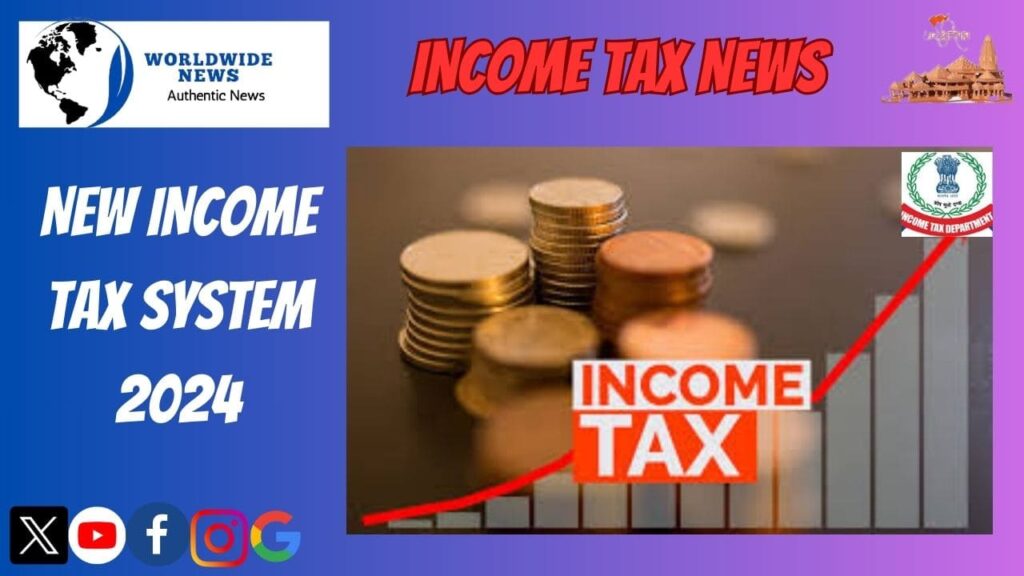The new income tax system came into effect on April 1, 2024. Individuals now have the option to choose between the new and old regimes. The government aims to increase interest among taxpayers through the new tax system.

Income Tax Exemption:
The government is striving to make the new income tax system attractive. Last year, Finance Minister Nirmala Sitharaman made several significant announcements in the central budget to make the new system appealing. The government seeks to enhance the interest of individual taxpayers in the new tax regime. Currently, individuals have the option to choose between the new and old tax regimes, and there is also an option to switch between them. However, many taxpayers are undecided about which system will be beneficial for them.
Benefits of the Old Tax Regime:
Both the new and old tax regimes have their respective advantages and disadvantages. In the new tax regime, tax rates are lower. However, there are no deductions available under various sections of the Income Tax Act. The most prominent of these are the deductions under Section 80C, Section 80D, and Section 24B. It is worth mentioning that Section 80C is related to deductions on life insurance policies, PPF, ELSS, and children’s tuition fees. Similarly, Section 80D is related to deductions on health insurance policies, while Section 24B is related to deductions on home loan interest payments.
Who Benefits from the New Tax Regime?
It is worth noting that deductions under Section 80C, Section 80D, and Section 24B are not available in the new tax regime. Experts say that the new tax regime is beneficial for taxpayers who do not claim any deductions. If an individual has taken a home loan and claims deductions on home loan interest every financial year, their tax liability is significantly reduced. Similarly, premiums on life insurance policies and health insurance policies also result in reduced tax liability.
Deductions in the New Tax Regime:
In 2023, Finance Minister Nirmala Sitharaman presented the central budget and allowed two types of deductions under the new tax regime. The first is a standard deduction of Rs. 50,000. The second segment is deductions available on the employer’s contribution to NPS under Section 80CCD(2). Pensioners can also avail of the standard deduction benefit. They can claim Rs. 15,000 or 33.33% of their pension, whichever is less, for this purpose.
Additional Benefits in the New Tax System:
It is essential to note that pensioners can claim the standard deduction only if the pension income is taxable. If a taxpayer opts for pension under other income, they will not be eligible for the standard deduction benefit. In the new tax regime, voluntary retirement, gratuity, and leave encashment are eligible for deductions. Divyangs (persons with disabilities) will also receive deductions on transportation allowances under the new regime.
Calculate your tax here : Link https://docs.google.com/spreadsheets/d/12mSYpJjRh0JhlSfA5hP2unlVuVrd7Ms2EzMWb8U6IRg/edit?usp=sharing
Frequently Asked Questions (FAQs) about the New Income Tax Regime in India
1. What is the new income tax regime that came into effect on April 1, 2024?
- The new income tax regime refers to the revised taxation system introduced by the Indian government, offering taxpayers the option to choose between the new and old tax regimes.
2. How do I choose between the new and old income tax regimes?
- Taxpayers can opt for either the new or old income tax regime based on their preference and financial circumstances. The choice between the two regimes depends on factors such as deductions and exemptions available under each regime.
3. What are the benefits of the old income tax regime?
- The old income tax regime offers various deductions and exemptions under sections such as 80C (life insurance premiums, PPF contributions), 80D (health insurance premiums), and 24B (home loan interest payments), resulting in reduced taxable income.
4. Who benefits from the new income tax regime?
- The new income tax regime may be beneficial for individuals who do not claim many deductions or exemptions under the old regime. It offers lower tax rates but does not provide deductions for various expenses like those available in the old regime.
5. Are there any deductions available in the new income tax regime?
- Yes, there are deductions available in the new income tax regime, including a standard deduction of Rs. 50,000 and deductions on the employer’s contribution to NPS under Section 80CCD(2). Pensioners can also avail of the standard deduction benefit.
6. Can pensioners avail of benefits in the new tax regime?
- Yes, pensioners can claim the standard deduction benefit under the new tax regime. They can claim Rs. 15,000 or 33.33% of their pension, whichever is less, along with other deductions available.
7. How do I know which income tax regime is suitable for me?
- Choosing the appropriate income tax regime depends on various factors such as your financial goals, income sources, and the deductions you intend to claim. It is advisable to consult with a tax advisor or financial expert to determine the most suitable regime for your circumstances.
8. Can I switch between the old and new income tax regimes?
- Yes, taxpayers have the option to switch between the old and new income tax regimes every financial year. However, it is essential to evaluate the impact on your tax liability before making any switch.
9. What are the key differences between the old and new income tax regimes?
- The primary difference between the old and new income tax regimes lies in the availability of deductions and exemptions. While the old regime offers various deductions, the new regime provides lower tax rates but fewer deductions.
10. Where can I find more information about the new income tax regime?
- Taxpayers can refer to the official website of the Income Tax Department of India or consult with tax professionals for comprehensive information and guidance regarding the new income tax regime.










